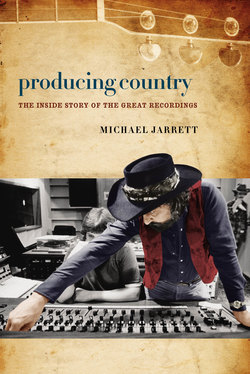Читать книгу Producing Country - Michael Jarrett - Страница 10
На сайте Литреса книга снята с продажи.
ОглавлениеACKNOWLEDGMENTS
One of my iPods holds the fifty-something recorded interviews that, excerpted, compose this book. These interviews form an oral history of country record production that is actually oral—actually audible. I conducted all of them. I spoke with every single person featured in this book (spoke with all but one by telephone). I recorded and transcribed every word they said.
Consequently, I’m familiar with the voices of the people I interviewed. I hear them as I read the words of this book. And that is a singular pleasure. I enjoyed talking with every producer I interviewed. I am, however, realistic enough to understand that a few of the guys who match up with the voices I hear are master manipulators: they’re powerful and, probably, ruthless; rich and, therefore, given respect for their rides on fortune’s wheel; influential (the unacknowledged architects of our aesthetics); and famous, though nearly as often infamous. The others, for any number of admirable reasons, never gave a shit about creating any sort of legacy. Or to paraphrase Porter Wagoner, with them what was to be just never happened, and what wasn’t to be, most of the time, did. Be that as it may, all of the voices I hear while reading evoke one simple and indelible impression: as a species, country producers are really, really nice. I owe them an enormous debt of gratitude, not only for making this book possible; they made it fun to make. I also owe a thank you to those record producers who never responded to my letters, emails, and phone messages. Without them, I never would have finished this project.
I first started writing about record producers twenty years ago when Pulse!, Tower Records’ magazine, ran a feature I wrote on jazz guys. Marc Weidenbaum edited it. One day, he told me, “You’re not just a contributing writer; you’re our ‘free-range chicken.’” (That was, far and away, the most flattering tag ever clipped to my collar.) Peter Melton gave me the go-ahead to write about producing country records. Instead of chopping up a long piece I wrote, he serialized it. Ned Hammad gave me more great assignments than I can now recollect. A phone call from Jackson Griffith was always a pleasure. From him, I learned to revere Nashville’s great visionary artist—the Prophet Omega. And so I want to send out a loud thank you to the many people, now scattered, that I worked with at Pulse!—before the deluge. What skills I possess as a writer are largely attributable to the many opportunities they gave me. They indulged me, repeatedly. As an editor at Pulse! and at Amazon.com and, especially, as the publisher of The Fretboard Journal, Jason Verlinde gave me work that contributed to the making of this book. He gave me the chance to write about producer and legendary guitarist Steve Cropper.
I pitched the idea of an oral history of country-record production first to Parker Smathers at Wesleyan University Press. He was supportive from the get-go, as was Daniel Cavicchi, editor of the Music/Interview series. Lauren Seidman, Bronwyn Becker, Richard Hendel, and Leslie Starr turned my manuscript into a book, and they made every step of that process a joy. Other people helped me indirectly but significantly. A conversation with Robert Ray leaves me full of ideas and thoroughly energized. We spoke about possible structures for this book, and his suggestions moved me to clarity. Greg Seigworth is my best friend. We’ve talked about record production many, many times; it’s difficult to assess the nature and depth of his contributions to most everything I write. The best stuff in this book is almost always the end result of good questions that he and a few other friends prompted me to formulate. Finally, I want to thank Pam for being in my life. She’s not that big on Tammy Wynette or Merle Haggard, which is kinda-sorta okay, I suppose. She’s crazy about Wynonna and the Dixie Chicks; I’m fine with that—to a degree. We both love Lucinda Williams, Shelby Lynne, and Buddy Miller. We both think Otis Redding is country, just like Carla Thomas said he was. And we both liked banana sandwiches long before we knew Elvis did too. “Ain’t we got love?”
